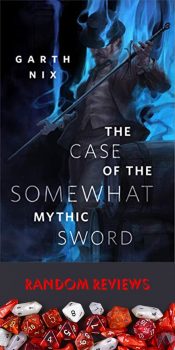Random Reviews: “The Case of the Somewhat Mythic Sword” by Garth Nix

“The Case of the Somewhat Mythic Sword” is Garth Nix’s second story about Magnus Holmes, the less capable brother of Sherlock and Mycroft Holmes, a fact that Nix addresses almost immediately when Magnus notes that “Everyone wants Sherlock.” in response to a bar owner’s comment that he was hoping Sherlock had taken the case. However, Magnus and his partner, “Almost-Doctor” Susan Shrike have their own strengths which can be brought to bear in this particular case.
While the Sherlock Holmes stories by Arthur Conan Doyle tend to rely on logic and deduction, Nix’s story about Magnus Holmes focuses more on the supernatural. Magnus, himself, is the subject of an amorphous curse that equates his being in darkness with the death and destruction of those around him. When the nature of this curse is revealed, it has a bigger impact on the reader who has not read Nix’s earlier Magnus Holmes story, “The Curious Case of the Moondawn Daffofils Murder as Experienced by Sir Magnus Holmes and Almost-Doctor Susan Shrike,” which appeared nine years before the current story.
Investigating the tavern’s cellar at the request of the publican, Magnus and Susan discover a medieval knight who has been enjoying the pub’s wine and paying with faery gold. The publican called for their assistance (or actually Sherlock’s) when a river appeared in his cellar around the knight. Discussion with the phantom reveals a link to the Arthurian legends and Magnus determines that he must help the knight achieve his goal in order to resolve his appearance in the cellar
When Mrs. Davies, a magical adept shows up and attacks Magnus, he determines that in order to defeat her, he must voluntarily unleash his curse and the rest of the story involves the battle between Magnus and his opponent and the destruction caused by both as Almost-Doctor Susan Shrike attempts to mitigate further disaster.
Nix does not attempt to capture the feel or flavor of Doyle’s stories in “The Case of the Somewhat Mythic Sword,” instead creating his own characters and style to tell a story that is only tangentially linked to Doyle’s canon. Magnus is a chance to write stories in the Victorian period which do not quite fit into the worldview of Holmes, but which do draw on Doyle’s own documented belief in the existence of fairies.
Although the story holds together while reading it, immersing the reader in the tavern which is roiled by supernatural occurrences, the story doesn’t quite satisfy, feeling as if Nix was mixing in several different ideas without completely tying them together. Because of these different elements, Magnus’s curse, Arthurian mythos, the villainous Mrs. Davies, the relationship between Magnus and Susan, etc., Nix could have expanded the story to make it feel more cohesive feel.
“The Case of the Somewhat Mythic Sword” was published on Tor.com on January 29, 2020 and published by Tor.com as an ebook. It has not otherwise been reprinted.
 Steven H Silver is a nineteen-time Hugo Award nominee and was the publisher of the Hugo-nominated fanzine Argentus as well as the editor and publisher of ISFiC Press for 8 years. He has also edited books for DAW, NESFA Press, and ZNB. His most recent anthology is Alternate Peace and his novel After Hastings was published in 2020. Steven has chaired the first Midwest Construction, Windycon three times, and the SFWA Nebula Conference 6 times. He was programming chair for Chicon 2000 and Vice Chair of Chicon 7.
Steven H Silver is a nineteen-time Hugo Award nominee and was the publisher of the Hugo-nominated fanzine Argentus as well as the editor and publisher of ISFiC Press for 8 years. He has also edited books for DAW, NESFA Press, and ZNB. His most recent anthology is Alternate Peace and his novel After Hastings was published in 2020. Steven has chaired the first Midwest Construction, Windycon three times, and the SFWA Nebula Conference 6 times. He was programming chair for Chicon 2000 and Vice Chair of Chicon 7.
Mycroft and Sherlock seem to have a lot of siblings, with identities dependent on the writer intruding on the Canon. This time, though, it appears the brother is a cousin, based on the story you reference.